If you're looking for top vegan and vegetarian dog food choices for ideal health, consider brands like V-Dog, Natural Balance, and Halo. They offer high-quality plant-based proteins and essential nutrients your dog needs. For vegetarian options, Nature's Recipe and Merrick provide wholesome ingredients that support digestion and energy. Always check for high-quality legumes, healthy fats, and fortified vitamins to avoid nutritional deficiencies. Shift gradually to help your dog adjust, and consult a vet if needed. With the right choices, you really can improve your dog's health and vigor. Keep exploring to discover more beneficial options!
Benefits of Vegan Dog Food
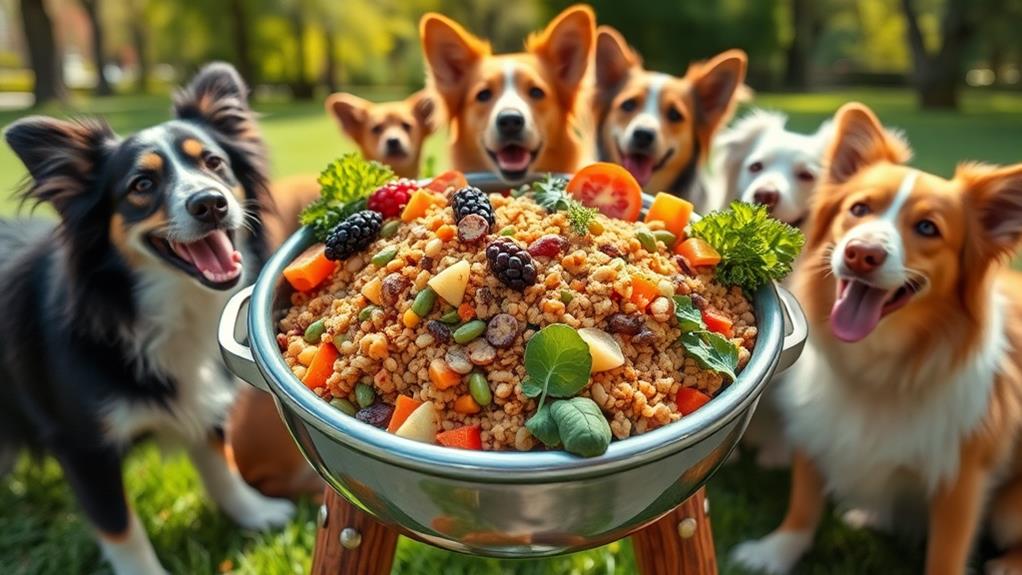
Vegan dog food offers several benefits that can enhance your dog's health and well-being. First, it can help reduce the risk of certain health issues, such as obesity and diabetes, by providing lower calorie options rich in fiber. This means your dog can maintain a healthy weight while enjoying mealtime.
Additionally, vegan diets are often packed with antioxidants and phytochemicals, which support a robust immune system and combat inflammation. This can lead to improved overall health and essential vigor for your furry friend.
Moreover, choosing vegan dog food can be beneficial for dogs with food sensitivities or allergies. Many plant-based formulas eliminate common allergens found in traditional meat-based diets, making it easier for you to find suitable options for your pup.
Lastly, switching to vegan dog food can align with your ethical values. If you're passionate about animal welfare and environmental sustainability, feeding your dog a vegan diet contributes to a compassionate lifestyle.
Nutritional Requirements for Dogs
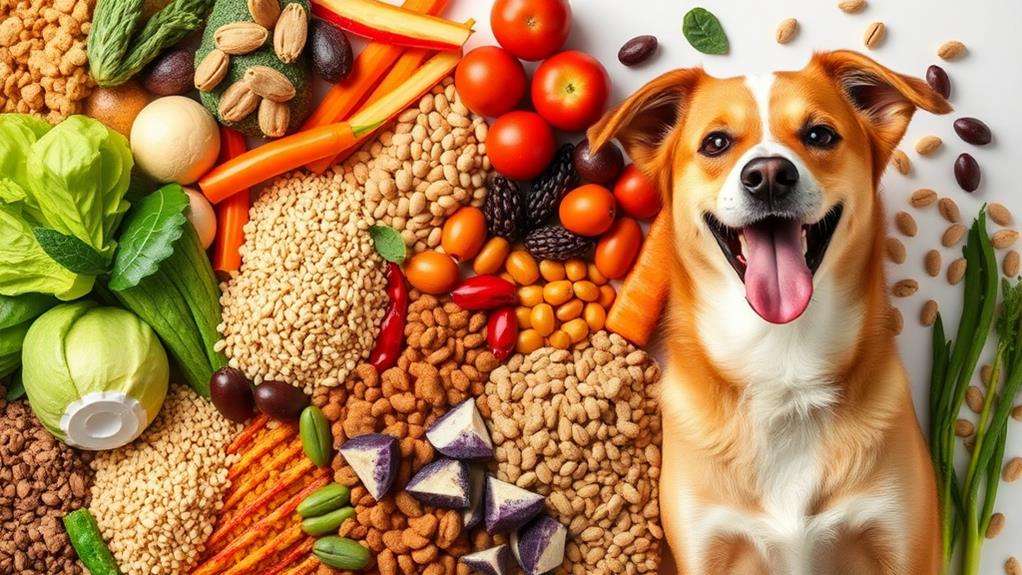
When considering a vegan diet for your dog, it's important to understand their nutritional requirements. Dogs are omnivores, meaning they can thrive on a mix of animal and plant-based foods, but they still need specific nutrients to stay healthy.
First, make sure your dog gets enough protein. While plant proteins can meet their needs, it's crucial to include a variety of sources like lentils, chickpeas, and quinoa to provide all essential amino acids.
Next, focus on essential fatty acids. Omega-3 and Omega-6 fatty acids are vital for skin and coat health, so consider adding sources like flaxseed or algae oil.
Additionally, your dog needs a balanced intake of vitamins and minerals. Pay special attention to Vitamin B12, calcium, and iron, as these can be lower in plant-based diets. You might need to supplement these nutrients or choose fortified foods to fill any gaps.
Lastly, don't forget about fiber, which aids digestion. Including fruits and vegetables can help meet this need. By carefully planning your dog's vegan diet, you can ensure they receive all the essential nutrients for optimal health.
Top Vegan Dog Food Brands
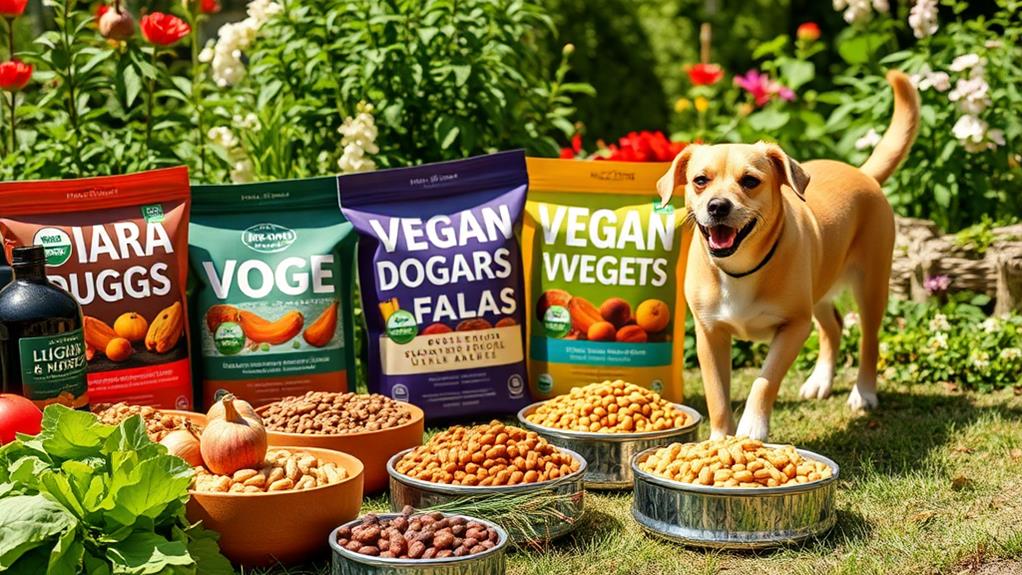
Finding the right vegan dog food brand can feel overwhelming, but several companies stand out for their commitment to quality and nutrition. When you're choosing a vegan diet for your pup, you'll want to look for brands that prioritize whole food ingredients and balanced nutrition.
| Brand | Key Ingredients | Benefits |
|---|---|---|
| V-Dog | Brown rice, peas, and carrots | High protein, all-natural |
| Natural Balance | Sweet potatoes, lentils, and quinoa | Nutrient-rich, easily digestible |
| Halo | Pea protein, carrots, and blueberries | Omega fatty acids, antioxidants |
These brands not only provide essential nutrients but also cater to different dietary needs. When you explore these options, be sure to check for certifications and reviews to guarantee they meet your dog's specific health requirements. With the right vegan dog food, you can support your furry friend's health while sticking to your values.
Popular Vegetarian Dog Food Options
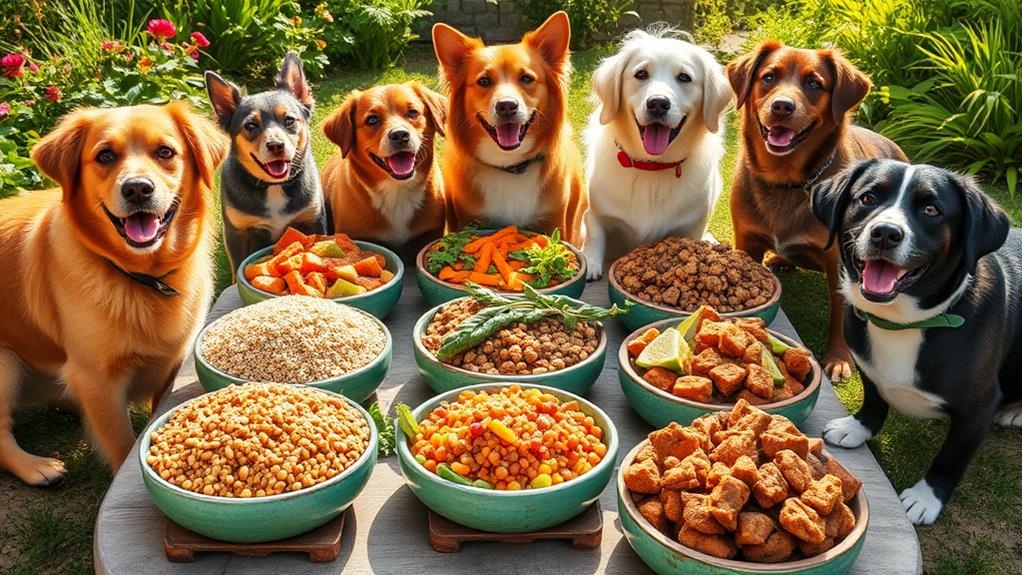
Exploring popular vegetarian dog food options can help you make informed choices for your canine companion. Many brands now offer high-quality vegetarian formulas that cater to various dietary needs. One widely recognized option is Nature's Recipe, which blends wholesome grains and vegetables, providing essential nutrients without animal products.
Halo is another favorite; their vegetarian recipes include a mix of plant-based proteins and antioxidants, ensuring your pup stays healthy and energetic. If you're looking for a grain-free alternative, Merrick's vegetarian line uses sweet potatoes and peas as primary ingredients, making it a great choice for pups with sensitivities.
V-Dog is specially formulated for dogs and is entirely plant-based, packed with vitamins and minerals to support overall health. Many pet parents also love Solid Gold, which offers a vegetarian formula rich in probiotics and superfoods, promoting digestive health.
Lastly, Canidae features a vegetarian option that combines fresh vegetables and wholesome grains, ensuring your dog gets a balanced diet. By considering these popular vegetarian dog food choices, you can provide your furry friend with a nutritious, meat-free diet that meets their needs.
Ingredients to Look For
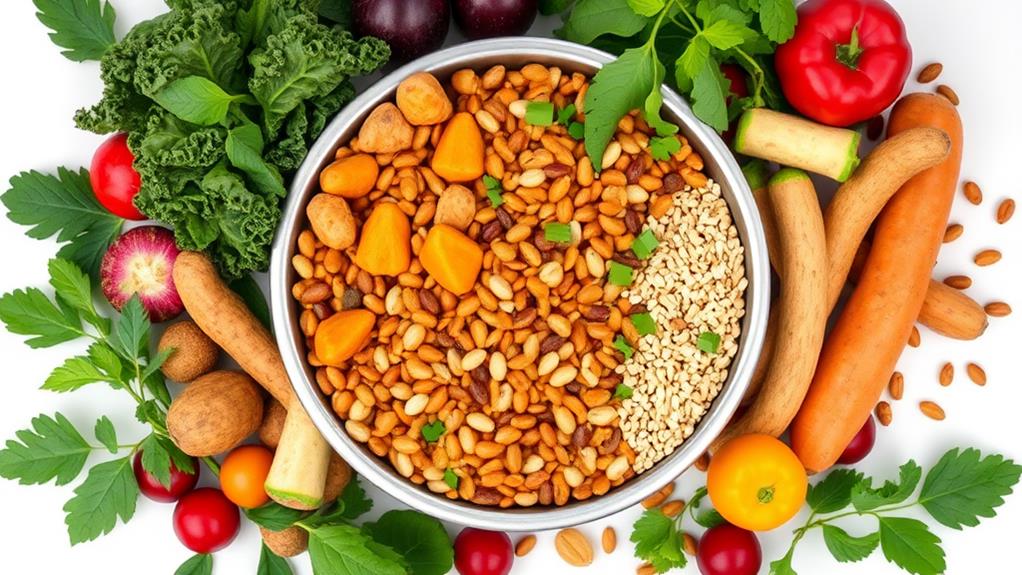
As you consider vegetarian dog food for your furry friend, it's essential to look for key ingredients that ensure a balanced and nutritious diet. Start by checking for high-quality protein sources, such as peas, lentils, or chickpeas. These plant-based proteins provide essential amino acids that support your dog's overall health.
Next, make sure the food includes whole grains like brown rice or oats, which offer fiber and energy. Healthy fats, such as flaxseed or chia seeds, are also important for maintaining a shiny coat and healthy skin. Omega fatty acids play a significant role in your dog's cognitive function and joint health.
Don't forget about fruits and vegetables! Ingredients like sweet potatoes, carrots, and blueberries can boost vitamins, minerals, and antioxidants, promoting a strong immune system. Additionally, look for probiotics that aid digestion and support gut health.
Lastly, consider a food that's fortified with essential vitamins and minerals tailored for dogs. This guarantees your pet gets all the nutrients they need. By focusing on these key ingredients, you'll be well on your way to choosing a vegetarian diet that keeps your dog happy and healthy.
Potential Nutritional Deficiencies
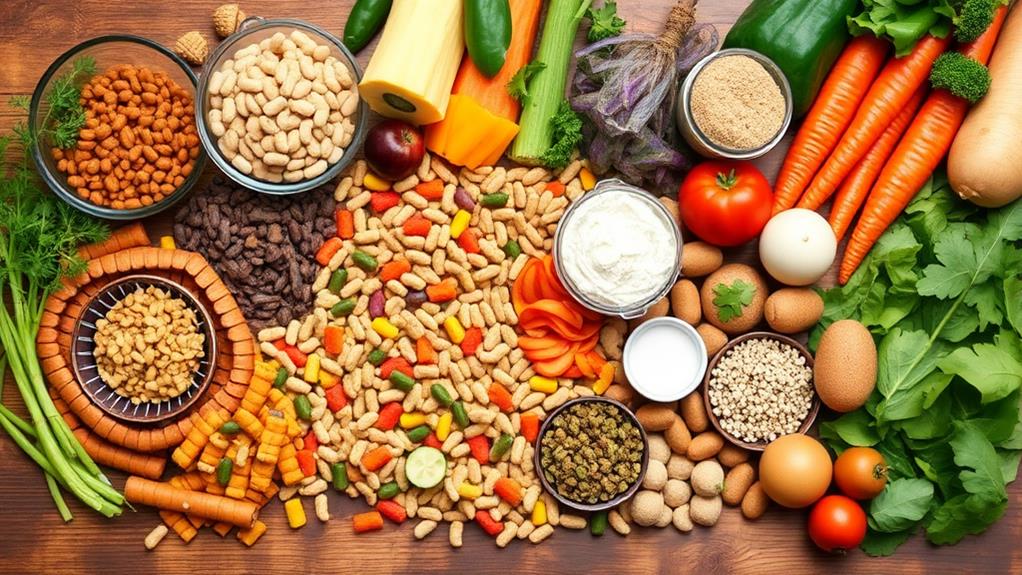
When migrating your dog to a vegetarian diet, it's indispensable to be aware of potential nutritional deficiencies that can arise. Dogs require specific nutrients, and a vegetarian diet may not always provide them in adequate amounts.
One of the primary concerns is protein. While plant-based proteins can be beneficial, they often lack certain essential amino acids that your dog needs for ideal health.
You should also consider omega-3 fatty acids, which are pivotal for skin and coat health. Flaxseed and chia seeds can help, but they may not be enough to meet your dog's requirements. Another critical nutrient is vitamin B12, commonly found in animal products. A deficiency in B12 can lead to serious health issues, so you might need to supplement it.
Iron and calcium are other nutrients that can be lacking in a vegetarian diet. While certain plant sources contain these minerals, they mightn't be as bioavailable as those from meat. To guarantee your dog thrives on a vegetarian diet, consult with your veterinarian or a pet nutritionist. They can help you identify potential deficiencies and advise on the best way to supplement your dog's diet effectively.
Transitioning Your Dog's Diet

After addressing potential nutritional deficiencies, it's time to focus on how to shift your dog's diet smoothly. Migrating to a vegan or vegetarian diet requires patience and careful planning.
Start Slowly: Gradually introduce the new food by mixing it with your dog's current food. Begin with a small ratio of vegan or vegetarian food, increasing it over several days.
Monitor Reactions: Keep an eye on how your dog reacts to the new diet. Look for signs of allergies or digestive issues, and consult your vet if you notice anything unusual.
Maintain Variety: Ensure your dog gets a balanced diet by offering a variety of plant-based proteins and nutrients. Rotate different brands and flavors to keep meals engaging.
Stay Consistent: Stick to a regular feeding schedule. Consistency helps your dog adjust and can prevent any digestive upset during the conversion.
Homemade Vegan Dog Food Recipes

Making homemade vegan dog food can be a rewarding way to guarantee your furry friend gets the nutrition they need while enjoying tasty meals. With a few simple ingredients, you can create delicious recipes tailored to your dog's preferences.
One easy recipe involves cooking 1 cup of quinoa, then mixing it with 1 cup of chopped sweet potatoes and 1 cup of green beans. Add a tablespoon of olive oil for healthy fats, and you've got a balanced meal packed with protein, fiber, and vitamins.
Another option is a lentil stew. Cook 1 cup of lentils, then combine them with 1 cup of diced carrots, 1 cup of peas, and a dash of turmeric for flavor. This hearty stew isn't only nutritious but also a great option for cold days.
You can also prepare a veggie mash by steaming 1 cup of broccoli, 1 cup of pumpkin, and 1 cup of spinach. Blend these ingredients together and serve them as a side dish to your dog's main meal.
Always remember to introduce new foods gradually and monitor your dog for any adverse reactions. Enjoy the cooking process and watch your pup thrive on your homemade creations!
Vet Recommendations on Diet
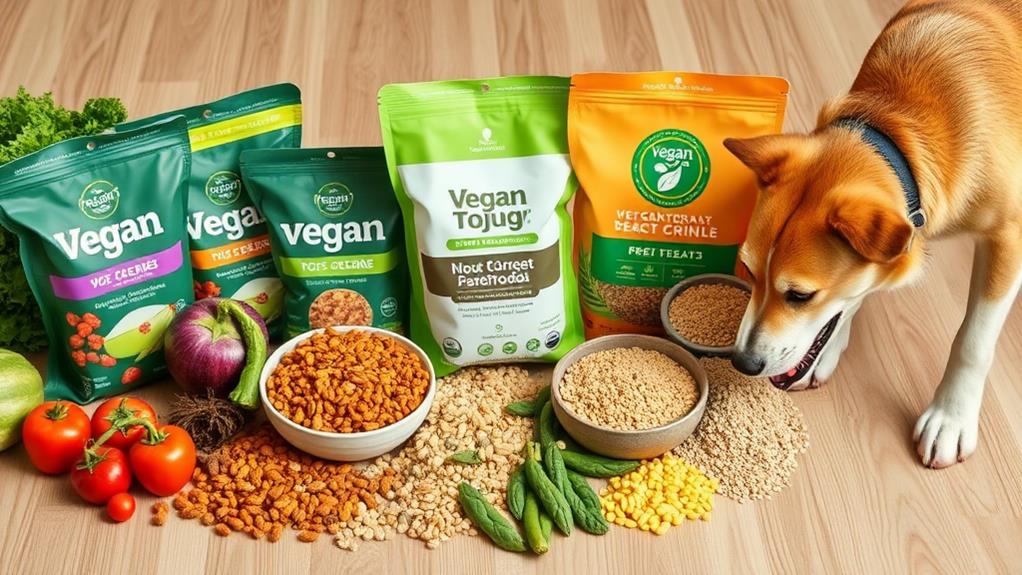
Veterinarians often emphasize the importance of a balanced diet for dogs, regardless of whether you choose commercial or homemade vegan options. They recommend focusing on a variety of nutrients to guarantee your dog thrives on a plant-based diet.
To help you make informed choices, consider these key recommendations:
- Protein Sources: Ensure your dog gets enough protein from sources like lentils, peas, and chickpeas. These legumes are excellent for muscle development.
- Essential Fatty Acids: Include sources of omega-3 and omega-6 fatty acids, such as flaxseed or chia seeds, to support skin and coat health.
- Vitamins and Minerals: Supplement their diet with essential vitamins, particularly B12, vitamin D, and minerals like iron and calcium, to prevent deficiencies.
- Consult Your Vet: Always consult your vet when shifting your dog to a vegan diet. They can help you formulate a balanced plan tailored to your dog's specific needs.
Real-Life Success Stories

Many dog owners have found great success in converting their pets to a vegan or vegetarian diet, often reporting remarkable improvements in health and robustness. For instance, you might read about a Labrador named Max, who struggled with obesity and skin issues. After switching to a plant-based diet, his weight dropped, and his coat became shiny and healthy. Owners like you have shared similar experiences, noting increased energy levels and fewer allergy symptoms.
Another heartwarming story involves Bella, a rescue pup with chronic digestive problems. After changing her to a vegetarian diet, her stomach issues vanished, and she now enjoys her meals without discomfort. These transformations highlight how a well-planned vegan or vegetarian diet can meet dogs' nutritional needs while promoting overall wellness.
You may be surprised by the positive feedback from owners who've made this move. Many report their pets are more playful and active, and some have even seen improvements in their pets' dental health. These real-life success stories can inspire you to ponder a plant-based diet for your furry friend, giving them the chance to thrive while enjoying a varied and nutritious meal plan.
Frequently Asked Questions
Can Dogs Be Allergic to Plant-Based Ingredients?
Yes, dogs can be allergic to plant-based ingredients. If you notice symptoms like itching or digestive issues, it's best to consult your vet. They'll help determine if the food's ingredients are causing the problems.
Are There Any Age Restrictions for Vegan Dog Food?
There aren't strict age restrictions for vegan dog food, but puppies, adults, and seniors have different nutritional needs. You should consult your vet to verify the chosen diet meets your dog's specific life stage requirements.
How Do I Know if My Dog Enjoys Vegan Food?
To know if your dog enjoys vegan food, watch their body language and eating habits. If they enthusiastically approach the bowl, wag their tail, and finish every bite, they likely love the meal you've provided.
Is Vegan Dog Food Suitable for Puppies?
Vegan dog food can be suitable for puppies, but you need to verify it meets their nutritional needs. Consult your vet to confirm the diet supports their growth, energy, and overall health during this critical stage.
How Can I Ensure My Dog's Diet Stays Balanced Long-Term?
To keep your dog's diet balanced long-term, stay on your toes. Regularly consult a vet, rotate protein sources, include varied veggies, and guarantee they get the right nutrients. Your pup's health is worth the effort!
Conclusion
Incorporating vegan or vegetarian options into your dog's diet can lead to impressive health benefits. Did you know that a study found dogs on plant-based diets had 25% fewer chronic health issues? By choosing the right food and shifting methodically, you can ascertain your furry friend thrives on a meat-free diet. Remember to consult your vet and explore high-quality brands to meet your dog's nutritional needs. With the right approach, your pup can enjoy a healthy, happy life!



